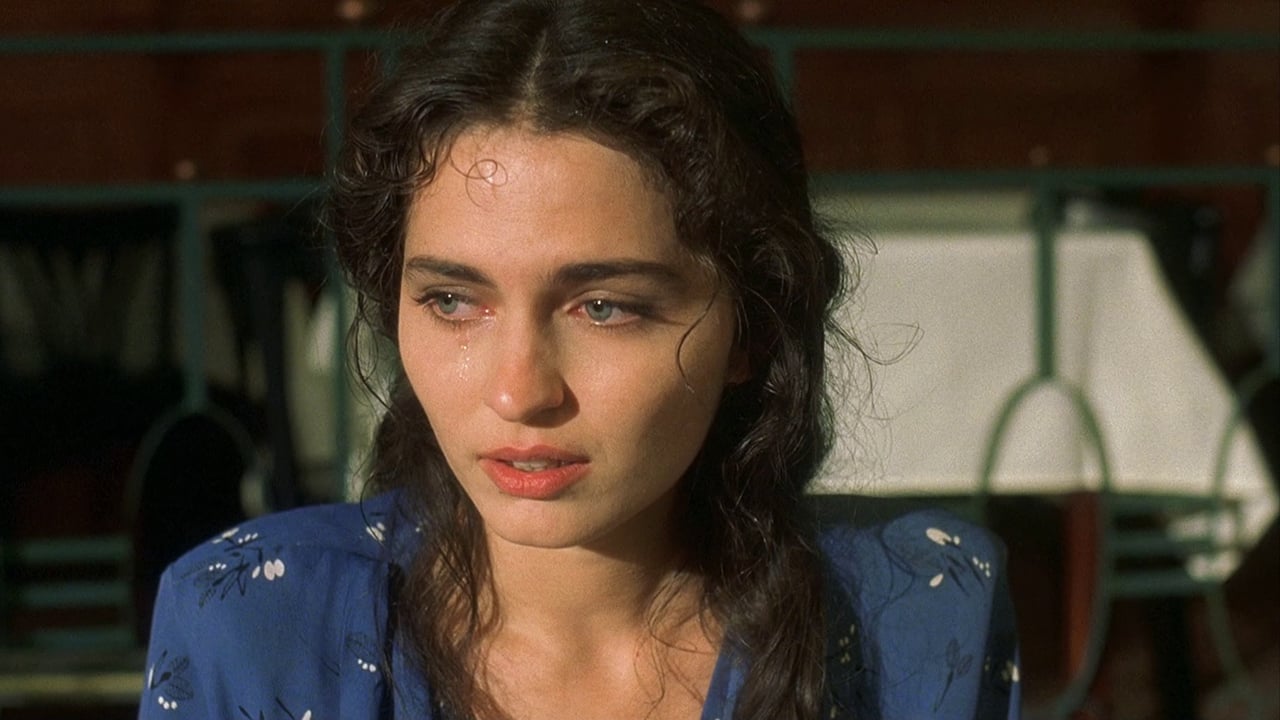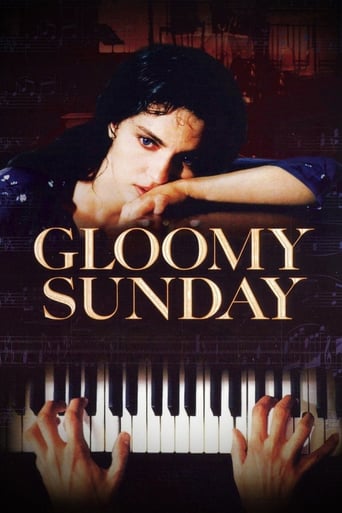

Fantastic!
... View MoreA Brilliant Conflict
... View MoreIt really made me laugh, but for some moments I was tearing up because I could relate so much.
... View MoreI didn’t really have many expectations going into the movie (good or bad), but I actually really enjoyed it. I really liked the characters and the banter between them.
... View MoreThe late 90s through the early 00s were a breeding ground for urban legends, as we saw in Magnolia (1999), Darwin Awards (2006) and of course the Urban Legends film & TV franchise spanning the decade. Maybe it's due to the fact that the internet, with its viral sensationalism, had just become popular while fact-checking resources had not yet caught up. This made for some very creative storytelling at the expense of truth. But heck, isn't that what storytelling is all about.Here we have "Gloomy Sunday" (1999) an intriguing story woven around the titular song which, as urban legend has it, caused or accompanied some 20 suicides (exaggerated to "hundreds" in the film). In reality, the song has never been credibly linked to any suicides except that a lot of people in Hungary killed themselves in the 30s when the song was recorded. But I dunno, maybe Hungary's Great Depression had a little more of a role in that statistic?Enough history. The rest of my review approaches this film as a pure work of fiction, and it's a pretty good one. It's not simply a 2-dimensional message like "sad songs kill people" but it cuts more to the root of what suicide is, the complexity of what motivates it (not just having a sucky life, otherwise a lot more of us would be at the bottom of San Francisco Bay), and how music, art, love and war resonate with the concept of killing oneself.The story revolves around a love rectangle between the song's composer (a piano player in a restaurant), a waitress, the restaurant owner and a regular diner in the resaurant. But it's no ordinary "jealous lover" type of cliché. Rather, the theme of love, just like the theme of death, is that it is a personal choice that cannot be subjected to society's morals or rules. In other words, the lovers place no conventional expectations on each other (though fury & resentment does play into it). Immediately it strikes you as a love story worth paying attention to.Next comes the theme of war, particularly World War II and the Nazi persecution of Jewish people. This adds tremendous spice, depth and peril to the situation. It's handled in a subtle yet chilling way that reminds me of the excellent Benigni film around the same time "Life Is Beautiful".Last but certainly not least is the story's climax and resolution which, itself is worth the price of admission. Let's just say I did not see it coming. And when a film can do that (without being ridiculous) I'm always impressed. I can't imagine anyone who wouldn't be.The music itself is nice, if you like the song "Gloomy Sunday", but if I were to nitpick, I have to say I didn't like the Heather Nova cover of the song at the closing credits because it featured the "updated" lyrics that were added to the English version in 1936 to make it less depressing (I'm talking about the "dreaming, I was only dreaming" part). I know Billie Holiday popularized that amendment in her famous version, but Billie is allowed to do whatever she damn wants!Bottom line: great story, great production, great acting & cinematography. But, as with the excellent film "Amadeus", don't expect to study for your musical history exam by watching it. This is creative storytelling at its best.
... View MoreGLOOMY Sunday (dir. Rolf Schubel) A haunting and award winning German film that offers an imagined account of the making of the Hungarian pop song, 'Gloomy Sunday', and some of the mysterious history surrounding the tune. This song is tied to a recurring urban legend that claims that many people committed suicide with this song playing, however when you check the facts, there seems to be no real evidence to support this allegation. This lugubrious pop tune happened to be written at the outbreak of WWII, and to make the claim that this song caused more people to end their lives than the immediate prospect of a world war seems almost too silly to imagine. However, the film becomes more successful when it shuns the metaphysical aspects of the song's legend to develop a (fictional?) love triangle between the composer of the song and his employer and girlfriend who run the restaurant where the pianist entertains the patrons. The film slips into melodrama as the Germans occupy Hungary, and another possible lover of the restaurant's hostess is introduced who happens to become a colonel in the Nazi SS. Although the film veers dangerously close to mawkishness, the 'doomed romance' described in the film does allow for somewhat of an entertaining experience.
... View MoreWartime Europe provides the backdrop to this tale of three star-crossed Hungarians blessed and cursed by the attractions of the superlative-defying Ilona. While male suitors László and Andras are the plot's most obvious victims, Ilona herself falls prey to her own powers, and the musical piece they inspire.In these IMDb days it is so difficult to come to a film completely cold, and I always feel a little sorry for audiences who do not get to experience films like Gloomy Sunday completely unencumbered. The blurb for the film tells you it is in one sense a menage-a-trois story, but that is already giving away too much for my taste. There are truly surprising and dramatic moments in this film: László dares to tell a joke that could cost him his life, Ilona makes an ill-fated decision to seduce Andras, and a moment of wonderful pathos climaxes the film as László is about to board a train. This is the film's cathartic climax, the resolution of the wartime tale being told in flashback. The actual 'resolution' of the film that takes place in the present time is just a shade formulaic and overcooks an otherwise superbly balanced and nuanced film. Excellent performances, a seductive musical theme, and extra plaudits for employment of a too-often neglected technique these days - leaving off-screen action to the viewers' imagination. Two suicide attempts and a character's ageing by 50 years are all conveyed through clever editing rather than expensive stunts, CGI or prosthetics. Maybe it was a budgetary rather than aesthetic decision to do so, but bravo nonetheless. Gloomy Sunday is a quality film with images and sounds that will remain with you long afterwards. Tragic but uplifting, my estimation of it grows with each subsequent viewing.
... View MoreThe charm of this film consist in the way to tell old things, in the description art of a well - known world."Gloomy Sunday" is a kind of Frankenstein's creature: pieces of "Lili Marleen", "Casablanca" or "The story of 1900", slices of Hungarian's atmosphere, Nazi ghost and menage en trois.For all that, it is a good movie, his virtue is, in fact, just absence of originality. Like many other movies, the spell is result of a mysterious flavor who persist in your memory months, years and in special moment it saves the image of a sweet trip.Undoubtedly, it is the story of a song, in same measure that the song is the only character. But, at second sight, it is a warm homage to Mitteleuropa, the gorgeous Kakania's spirit. The lost of youth and the last recollection's skin. The shadow of Goethe's "The Sorrows of Young Werther" is powerful and insidious.A subtle wishfulness anatomy. And a song like his backbone.
... View More